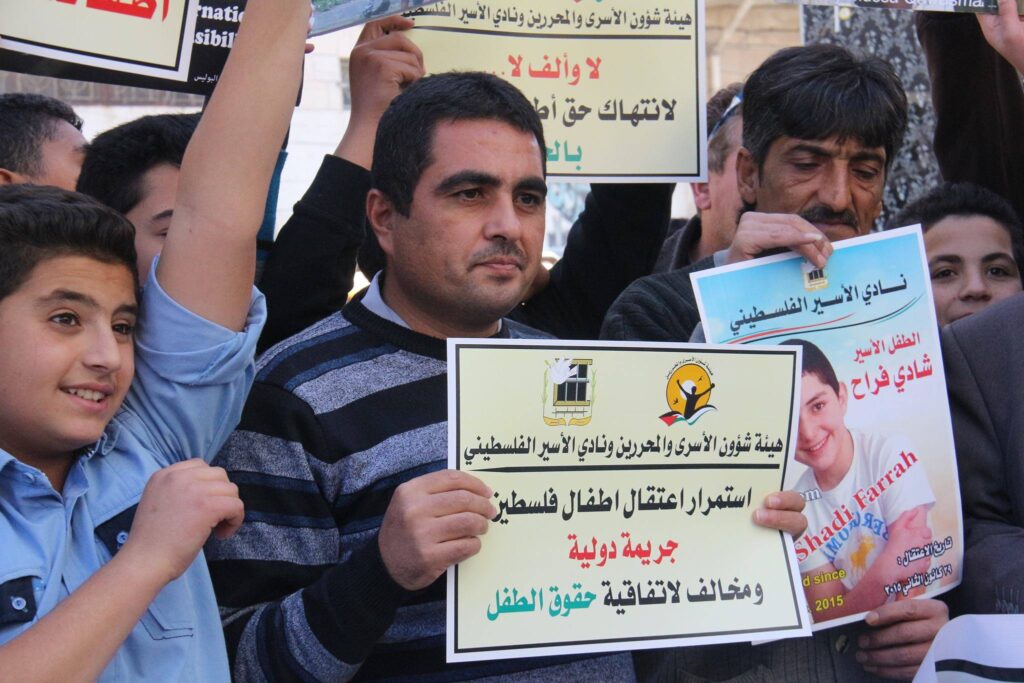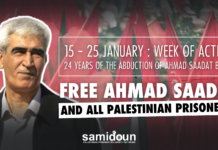
Palestinian organizer Badee Dwaik, co-founder of the Human Rights Defenders group that has been coordinating actions and popular organizing to confront settlements and occupation in al-Khalil, was recently seized by Israeli occupation forces with three of his colleagues in the #DismantleTheGhetto movement, Anan Odeh, Ishaq al-Khateeb and Younis Arar.
The four organizers, swiftly known as the #alKhalil4, were participating in a Land Day protest on Thursday 30 March when they were attacked by occupation forces. Following his release, Dwaik spoke with Samidoun Palestinian Prisoner Solidarity Network about his experience under arrest and interrogation. He noted that he had previously been arrested, interrogated and jailed on multiple occasions, but that this experience highlighted intensified repression. In fact, only one month prior, on 24 February 2017, Israeli occupation forces had invaded Dwaik’s home and threatened him with arrest.
The four organizers were part of an action that involved planting olive trees, where they were attacked by settlers. Despite the attack, they continued marching to the center of their city of al-Khalil, which has been subject to forcible closure by the Israeli occupation and its settlers. As the demonstration continued, occupation forces declared the area a closed military zone and picked Dwaik, Dana, Arar and Khateeb out of the crowd of about 50, accusing them of participating in an “illegal demonstration.”
Dwaik noted the presence among the harassing settlers of the notorious Ofer Ohana, who was also present for the extrajudicial execution of Abdel-Fattah Al-Sharif by Israeli occupation soldier Elor Azariya. The murder of al-Sharif came to light as it was videotaped by Imad Abu Shamsiya, co-founder of Human Rights Defenders. Ohana was videotaped kicking a knife near the body of Sharif and referring to Sharif and his fellow slain Palestinian, Ramzi al-Qasrawi, as “the trash.” Dwaik noted that Ohana has threatened Abu Shamsiya and Dwaik and repeatedly harasses them as they carry out tours of al-Khalil with internationals.
The four were arrested under false pretenses, Dwaik said. They were accused of being in the street, said Dwaik, even though three of the four were standing on a grassy hill and one of the four, Anan Odeh, was off to the side of the road. At the present time, while the four were released on bail, they continue to face allegations in Israeli military court – where Palestinians are convicted at a rate of over 99 percent – of “disturbing the public peace of the area,” organizing an “illegal action,” attempting to escape from the army, and “blocking the street.”
Dwaik noted that he denied all allegations under interrogation and refused to sign any paperwork or confessions. He and his fellow organizers were taken by occupation forces to the Kharsina military camp near Kiryat Arba settlement. Dwaik, who has diabetes, was sent to a medical worker; he stated that he needed medicine for his diabetes, but that the medical worker gave him two cold tablets but nothing to address his actual medical condition.
Later, Dwaik reported, he was taken to Shaare Tzedek hospital from 11:00 pm to 3:30 am, during which he received medical tests. He was told that he would receive insulin, but when Dwaik explained that his diabetes is treated with medication, they told him they would sell him a tablet. However, they still did not provide his medication and he was instead told that he would receive medication in jail.
Dwaik was then sent to the Etzion detention center (jail), where he reported that he was subject to an experience seemingly designed for humiliation and subjugation. The jail officers demanded Dwaik strip down, including removing his underwear. As he refused to remove his underwear, the jail officers demanded him to repeatedly move about and stand up and sit down in an attempt to humiliate him. He was then told that he would be left there until the morning without clothes. However, when he still refused to remove his underwear, he was finally given his clothes and put in the room with his fellow detainees.
The conditions at Etzion and other detention centers, where Palestinians are often held under interrogation and prior to being transferred to the major prisons, have been repeatedly highlighted by former prisoners for their unsuitability for human life. Palestinian prisoners have even launched hunger strikes to demand to be moved to regular prisons and have repeatedly reported beatings and assaults in the Etzion jail.
When he arrived in Etzion, he was told that his belongings would be registered; however, the jailers refused to register his belt and instead confiscated it; Dwaik noted, “I have been arrested many times before, but was never ordered to remove underwear or had my belt confiscated.” Among his belongings was also 42 NIS ($11.50 USD), which was registered at the time. Dwaik noted that he was denied cigarettes despite being registered as a smoker; when he questioned this, he was told that he was “being punished” because he refused to remove his underwear the night before.
Dwaik particularly highlighted the unlivable conditions in Etzion. The room where he was sent contained five or six bunk beds, but the beds were blank and had no mattresses; instead, Dwaik said, prisoners are forced to fold blankets beneath them to serve as makeshift mattresses. These blankets, Dwaik noted, are unclean and pose a danger to health; they are used by many prisoners and are rarely washed. The Palestinians detained in Etzion are served leftover food from the army’s meals, often significantly later when the food is sparse and cold. The cells themselves are in a very poor condition and insects are visible inside the room, as well as mice and other vermin. “Some people get stuck in the detention centers for long periods of time, even 2 months, and it is a form of daily torture,” Dwaik said.

Dwaik noted that there are no books or recreation time for detainees held in Etzion, and that some other prisoners had reported the shower areas being closed for four or five days at a time. Despite the earlier interactions with medical staff, he still did not receive diabetes medication. Instead, he was told that he would be sent to Ofer prison in the afternoon.
He noted that Palestinian prisoners are often left without food because they are transported to the military court or from jail to jail during mealtimes; no replacement meals are provided. This is such a common problem that it is even included among the demands of Palestinian prisoners in the large hunger strike planned to begin on 17 April, Palestinian Prisoners’ Day.
Ofer is a large Israeli prison and the only major Israeli occupation prison (rather than detention centers and interrogation centers) inside the West Bank. The prison has 10 sections of about 120 people each, for a total of approximately 1,200 prisoners, Dwaik reported. Most are political prisoners, but Palestinians arrested for “non-political” charges by the Israeli occupation – such as, for example, Palestinian workers seized for working inside Palestine ’48 without a permit – are also held in the prison. During his short time in Ofer, he was repeatedly transferred from one section to another. While in the prison, he saw a number of fellow Palestinian prisoners, including imprisoned BDS campaigner Salah Khawaja and youth organizer Hassan Karajah, both of whom greeted the international activists working for their freedom and that of their fellow prisoners.
The case of the four was brought before the military court in Ofer on Sunday, 2 April. While Dwaik and Dana were brought to the military court, he noted that their fellow #alKhalil4 detainees, al-Khateeb and Arar, weren’t even brought before the military court. During the hearing, the military prosecutor urged that the four be held for five additional days for further interrogation, stating that there is a “secret file against” Dwaik, the framework that is used to order Palestinians to imprisonment without charge or trial under administrative detention. Dwaik noted that this was also the first time that a “secret file” had been raised against him despite numerous arrests. While the military court judge refused to release the four – as demanded by their lawyer – he ordered them held only one more day and a new military court hearing the following day, Monday, 3 April.
He noted the degrading experience of waiting for a military court hearing to begin. “You are moving from room to room all the time and you are shackled hand and foot all the time. We had to wait on Monday from 8 am to 3 pm as we are handcuffed. They only take off the handcuffs when you’re in the military court, then they handcuff you again and shackle your feet. It is a system that is meant to humiliate,” Dwaik said.
Dwaik noted that on Monday, as he entered the military court in Ofer, he saw Palestinian student Kifah Quzmar, who was exiting the military court, having been ordered to six months in administrative detention. Quzmar told Dwaik of his sentence and expressed his greetings to the organizations and people around the world engaged in the campaign for his release.
In addition, Dwaik noted, some international observers in Palestine attempted to attend the military court hearing for the four, but were barred from entering. Journalist Amira Hass attended the hearing along with the representative of Defence for Children International in al-Khalil. In the military court hearing on Monday, the alleged “secret file” went unmentioned; instead, the military prosecutor now demanded 7,000 NIS ($1912 USD) from each of the four as bail. Dwaik stated that he does not have the money for such a high bail and that he would stay in jail instead; negotiations then ensued and a bail of 3,500 NIS ($956 USD) was set for each of the four. He noted that #DismantleTheGhetto campaigners and supporters donated to cover the bail, which was paid around 3:00 pm; however, the four were not released until 10:30 pm.
During their release, Dwaik noted, “they push you with their guns and don’t let you check that you even have your belongings.” He lost his belt, and the 42 NIS ($11.50) he had when entering prison was stolen. Throughout his time in Israeli jail, he never received any medicine for his diabetes.
Dwaik noted that “all of the Palestinian political organizations support the #DismantleTheGhetto campaign, and all of the NGOs that support human rights. This is why we were targeted, because this is a unified Palestinian campaign with many actions.”
“We need more work for the Palestinian cause and people to keep building support for Palestine. The #DismantleTheGhetto campaign in al-Khalil is part of these efforts,” Dwaik said. He stated that Palestinian prisoners need international support and that many will be launching a strike on 17 April, noting that Samidoun and other groups have an important role to play in building solidarity with the prisoners. “Palestinian prisoners are struggling for their dignity and freedom every day,” Dwaik said, “from the 13-year-old children like Shadi Farrah to the veterans who have spent 30 years behind bars.”
Discover more from Samidoun: Palestinian Prisoner Solidarity Network
Subscribe to get the latest posts sent to your email.




